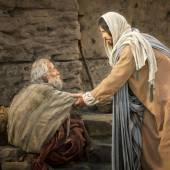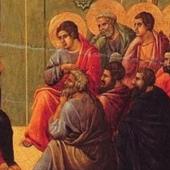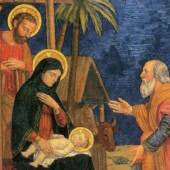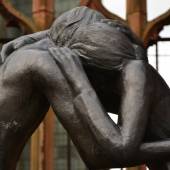Faith means loyalty in many ways
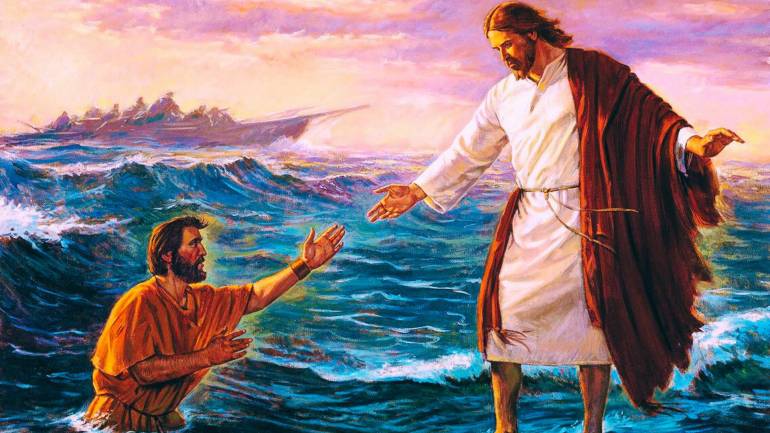
Sunday, August 13, 19th Sunday in Ordinary Time
Daily Readings: First Reading: 1 Kings 19:9a, 11-13a, Ps 85:9, 10, 11-12. 13-14, Second Reading: Rome 9:1-5, Gospel: Matthew 14:22-33
God's experience is therapeutic. It heals. That healing is holistic. It is a sign of God’s compassion. There are three biblical heroes in today’s readings besides Jesus, the Son of God: Elijah, Paul, and Peter. All of them are in dire need of God’s mercy for various reasons. Elijah and Peter have personal reasons, while Paul has pastoral concerns. Elijah experiences God’s compassionate intervention without even asking for it when he is struggling to find meaning in his life. He is indeed a man of God who could not abandon His servant.
As he prepares to travel to Rome to stand trial by Caesar, Paul is filled with great sorrow and heartache. His anxiety is not for himself but for his people, who have a glorious past. He also entertains thoughts of being accursed and cut off from Christ for the sake of his own people (cf. Rom 9:3). In his pursuit of meeting Jesus, Peter meets with such strong winds and waves that he is frightened of dying. The other disciples face the test of not being able to identify the Lord. Nothing great is achieved without the grace of God.
The first reading is from the First Book of Kings and narrates Elijah’s God experience on Horeb, the Mountain of the Lord. Horeb and Sinai are one and the same mountain. Elijah had a successful encounter with the priests of Baal and Asherah. It ended in the massacre of 850 prophets (cf. 1 Kgs 18:19). Ahab, the king, reported this news to Jezebel, the queen, who vowed to take revenge on Elijah. The man of God flees from the sight of Jezebel and, in fact, from the sight of God and himself, as he was pleading to end his life. The Lord sustains him for 40 days and 40 nights with the help of the food that was supplied by the angel of the Lord. Thus, he reaches Horeb and finds a comfortable zone: a cave to hide in. At this juncture, God invites Elijah to meet him—not in a great wind nor in the earthquake nor in the fire, but in the sound of sheer silence.
The Responsorial Psalm is a prayer for revival and restoration. It is a part of a very long national lament. The author prays to God that He may restore the intimate covenant bond with Israel. God’s people are to remember that infidelity to the covenant could cause God to work havoc in creation. Those who fear God and act justly can expect God to restore order to creation. Therefore, the Psalmist prays, "Lord, let us see your kindness, and grant us your salvation".
The Second Reading is taken from the Letter of St. Paul to the Romans. Paul wrote this letter in advance of his upcoming visit to Rome so that the emperor could try him. He says that he writes it under the inspiration of the Holy Spirit and therefore speaks only the truth. He expresses his great sorrow and anguish of heart because of the non-cooperation of his own people. God wanted to form a believing community. They failed to come to faith in the gospel. As a result, they disqualified themselves from inheriting the promises made to them a long time ago. Paul laments for the Israelites, who were God's specifically chosen people. To them belong God’s adoption, the glory, the covenants, the law, the worship, the prophets, the patriarchs, and finally the Messiah. The Israelites enjoyed all these eight prerogatives, yet they failed to accept Jesus as the Messiah.
The Gospel Reading situates the disciples in the Sea of Galilee, perhaps the only source of livelihood for the people around Galilee. Although the Sea of Galilee is not enormous in size, it is known for its occasional storms and winds, which put the fishermen at risk for their lives. In today's reading, the waves are battering the disciples' boat as the wind is blowing strongly against them. The sea is sure to calm down at one moment or another, but what is disheartening for the reader is the inability of the disciples to recognize their master, with whom and around whom they have built their lives.
As if rubbing salt into the wound, they see Jesus and yet think that he is a ghost. Peter’s inability to believe in Jesus while walking up to him could surprise us. We could also think of Prophet Elijah’s helplessness to cope with his situation or Paul’s despair. These biblical heroes had to overcome their wavering loyalty to God. Faith means loyalty in many ways. They had to worship Jesus and confess, "Truly you are the Son of God" (Matt 14:33).
Radio Veritas Asia (RVA), a media platform of the Catholic Church, aims to share Christ. RVA started in 1969 as a continental Catholic radio station to serve Asian countries in their respective local language, thus earning the tag “the Voice of Asian Christianity.” Responding to the emerging context, RVA embraced media platforms to connect with the global Asian audience via its 21 language websites and various social media platforms.









